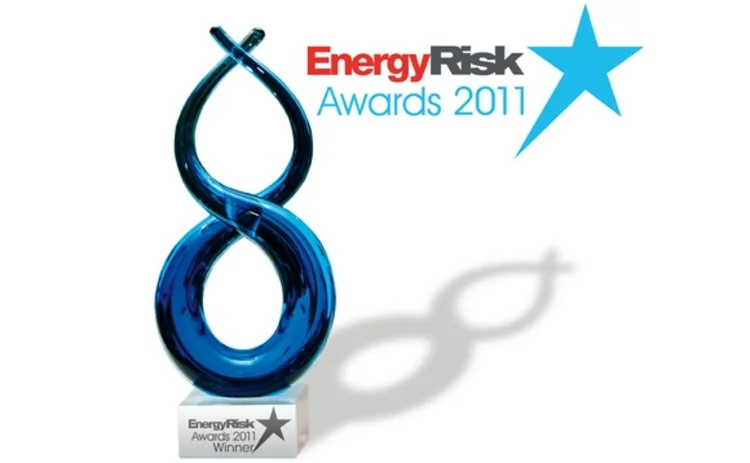Energy Risk Finance House Award: Société Générale CIB
Energy Finance House of the Year: Société Générale Corporate & Investment Banking

Société Générale Corporate & Investment Banking (SG CIB) wins this year's Energy Finance House of the Year award for its key roles in several innovative international projects including a ground-breaking wind project financing in China, the Nord Stream pipeline, the financing of the Jubail Refinery in Saudi Arabia, and a new type of offering for BP in the wake of the Gulf of Mexico oil spill.
SG CIB was mandated lead arranger, foreign exchange and interest hedge provider and account bank for the 201-megawatt Ganhekou Wind Farm No.8 scheme, which is one of only two such projects in China.
Not only was it an innovative project for wind, but it effectively re-opened the project finance market in China for the first time since 2006.
"China is one of the biggest investors in renewable power but it had not done a renewables project on a pure project finance basis - such as this one - before," says Robin Baker, global head of project and reserve-based financing for the energy sector in London. "This was a new way to finance wind in China."
The deal had a private-sector Hong Kong-listed company as sponsor and involved setting up a US-dollar offshore financial structure, which complied with Chinese law while meeting the risk mitigation expectations of international banks. It included a long-term currency hedging strategy. As well as the private Chinese sponsor structure, this was one of the first financings in China where international lenders relied on Chinese equipment, Baker says.
Due to this, and because of the nature of renewables deals to rely on government and regulatory support, the project required high-level governmental negotiations. "It is for governments to decide how much support they wish to provide, so lenders need to understand governments' intent," says Baker.
Another deal involving government buy-in was the financing of the €3.9 billion Nord Stream pipeline, linking Russia to Europe via the Baltic Sea. SG CIB structured the financing with almost 80% export credit agency (ECA) support with the unprecedented large-scale use of a German untied ECA. Syndication was completed in 2010 with 60% oversubscription. "This was a major deal; one of the largest in Europe after the financial crisis," says Baker.
As in most large project financings, SG CIB came up against a number of structuring issues, but the project had strong sponsorship, says Baker. "It was important to SG CIB and the sponsors' reputation that it was a smooth and efficient delivery - and it was. Many hours were involved on the advisory side working on all the structural issues to identify how we could sell it effectively into the debt markets."
SG CIB's co-ordination skills were called on for its role in the $8.5 billion Jubail Refinery financing in Saudi Arabia, a key project allowing the country to diversify its crude oil exports with higher-value refined and petrochemical products. As documentation agent, SG CIB helped arrange the dual currency financing, mobilising 17 international banks, many ECAs, 12 Saudi bank funds and a sukuk, an Islamic financial product. "If you look at the refining sector over a long period of time it is not generally one of the most attractive sectors in terms of returns," says Baker. "But this refinery project was different. Lenders look to a project's sponsorship and to its economic fundamentals - and Jubail looked strong on both counts."
The bank also has the ability to respond swiftly to global events as proven by its prompt reaction to the needs of BP following the Macondo incident in the Gulf of Mexico. SG CIB stepped in early with a financing proposal for BP Caspian. After thorough corporate analysis and a review of what liabilities could hit the company, it assisted BP by putting together a $2.2 billion financing deal, half of which it underwrote in six weeks. SG CIB was also a lead in financing a BP project in Angola. "These were both major assets of BP where we could rapidly structure a limited recourse that was attractive to the company," says Baker. "We believe our ability to move rapidly to secure a large amount of finance with assured delivery was important to BP."
The company mandated four banks to arrange separate but simultaneous non-recourse pre-export financings linked to the company's operations in Azerbaijan and Angola. These transactions represented two of the largest pre-funded, underwritten financings within the emerging markets arena and the first transactions of this type for BP entities, according to SG CIB.
Ultimately, SG CIB's aim is to be the leading bank in the industry. "We want to be the firm where, when sponsors have a really important deal and a successful close is really crucial, they turn to us first," concludes Baker.
Click here to view the article in PDF format.
More on Awards
Environmental products house of the year: ENGIE
Energy giant signs raft of forward-thinking environmental deals in Apac
Newcomer of the year: Marex
Commodities and financial services firm expands rapidly across Apac region, entering multiple new markets
Voluntary carbon markets house of the year: Marex
Marex’s support of mangrove projects provides high-quality credits for clients and socio-economic benefits for local communities
OTC trading platform of the year: Marex
Marex’s Agile platform registers impressive volume and client growth in Asia
Technology advisory firm of the year: KWA Analytics
With a focus on strategy and scalability, KWA Analytics improves clients’ operations in Japanese power, biofuels and certificates
Commodities technology house of the year: Topaz Technology
Strong revenue growth, Asia focus and a unique approach to unifying physical and financial risk
Electricity house of the year: Provincial Electricity Authority (PEA)
Power company uses renewables to help Thailand attract energy-intensive manufacturers amid recent geopolitical shifts
Energy Risk Asia Awards 2025: the winners
Winning firms showcase the value of prudent risk management amid challenging market conditions







